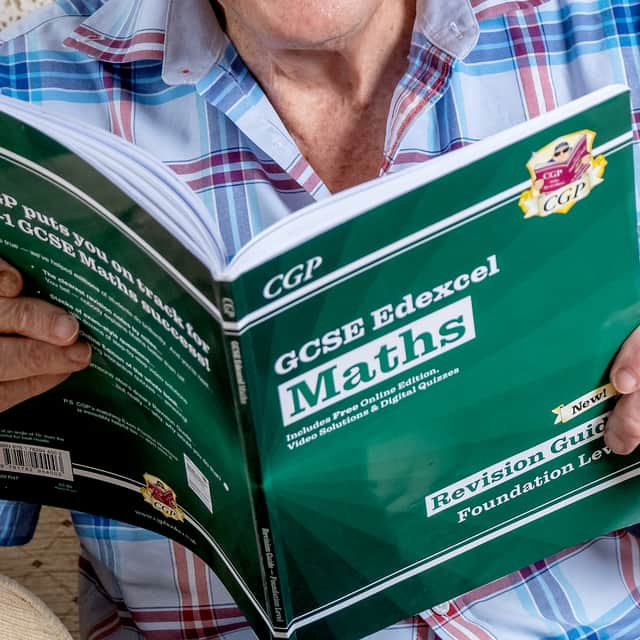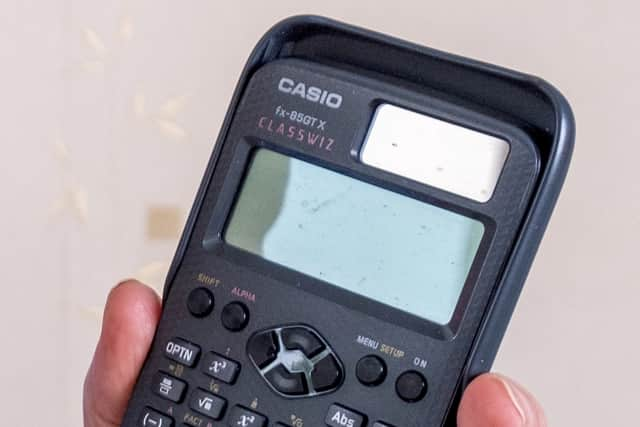Scottish adults admit maths makes them nervous


The quiz - released ahead of National Numeracy Day - will test your ability to complete day-to-day calculations such as calorie count percentages and or rail fare increases.
It follows research which found 29 per cent of Scots claim doing maths makes them feel anxious, while almost one in six (14 per cent) are so fearful it even makes them feel physically sick.
Advertisement
Hide AdAdvertisement
Hide AdA study of 3,000 UK adults found numeracy gives many feelings of fear or unease, while 29 per cent actively try to avoid anything to do with numbers and data.
But for 29 per cent of Scottish respondents, the cost-of-living crisis has placed greater pressure on their numeracy skills, and of those with low number confidence, a third feel it affects their mental wellness.
Building confidence in numbers
More four in 10 (42 per cent) stopped studying maths at school as soon as they were able to, however 39 per cent have taken steps to improve since secondary school.
But 61 per cent admitted you don’t realise how important maths skills are until you’re older and are using them to navigate daily life.
And 69 per cent backed the notion the UK needs to take additional measures to address the issue of low number confidence, with 44 per cent acknowledging a greater emphasis being put on improving numeracy skills in recent years.
The research was commissioned by professional services firm KPMG UK, in collaboration with the charity National Numeracy, which runs the National Numeracy Day campaign, taking place on Wednesday 17th May.
The annual day, now in its sixth year, aims to inspire everyone to have the confidence and skills to work with, and understand numbers, so they can get on in life.


Tackling the fear of digits
Bina Mehta, Chair at KPMG in the UK, said: “Confidence with numbers isn’t reserved for mathematicians, it’s an essential skill helping us navigate daily life – from understanding interest rates to working out value for money while shopping.
Advertisement
Hide AdAdvertisement
Hide Ad“Those lacking confidence in their numeracy skills are more vulnerable to debt, unemployment and fraud.
“As our research highlights, the impact on wellbeing can’t be underestimated, especially against the backdrop of the cost-of-living crisis.
“Maths is far more than a classroom subject, it’s a skill like any other, and it can be improved at any age.
“As two-thirds of our respondents suggested, you don’t always realise how important these skills are until you’re older.
“If we want to build a more prosperous and fair economy, we all have a duty – as individuals, businesses, policy makers and education leaders – to ensure numeracy skills get the attention they deserve.”
The study also found 29 per cent of Scots would be put off a job role if it mentioned having to deal with numbers and data, while 47 per cent believe their lack of confidence affects their ability to do their job, according to the OnePoll data.
But the cost-of-living crisis has made it easier to talk more openly about their numeracy for 22 per cent.
Despite this, 24 per cent want to improve their skills, but don’t know where to start.
Advertisement
Hide AdAdvertisement
Hide AdSam Sims, chief executive at National Numeracy, added: Tackling people’s fears and worries about numbers is a vital first step if we want the nation to get on with numbers.
“Focussing on exams and courses alone won’t work for the millions who hated maths at school - we know a bad experience at school is linked to lower number confidence and attainment.
“So, from early years and primary school, right into adulthood, we’d like to see the confidence to understand and work with numbers form a central part of maths learning in the UK.
“Maths is a mental wellness issue, as this survey shows. We need to get better at acknowledging and supporting those who struggle with numbers – it has very real effects on their lives and livelihoods, which the cost-of-living crisis has highlighted.
“Feeling anxious about maths is completely understandable. Our charity offers vital support and can help people begin to feel better about the numbers in their everyday lives.”
Comments
Want to join the conversation? Please or to comment on this article.